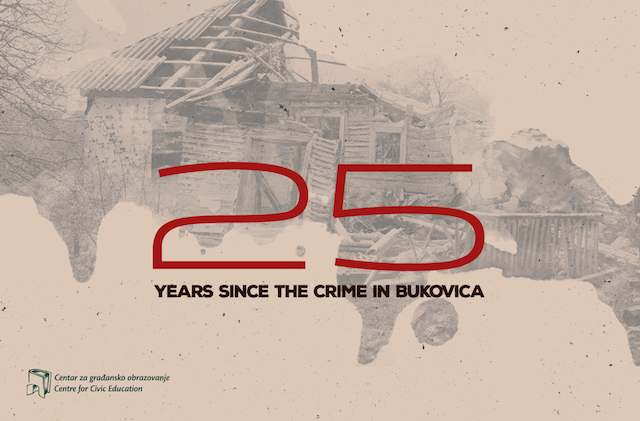On the occasion of 25 years since the crime that occurred on 14 February 1993, in municipality of Čajniče, where members of so-called Army of B&H, amongst whom were eight Montenegrins, attacked unprotected villages Trpinje and Šapići from the territory of Montenegro, i.e. from the direction of the village of Bukovica, the Centre for Civic Education (CCE) uses the opportunity to pay respect to all victims of this crime, but also to victims from the territory of Pljevlja’s Bukovica, whose Muslim population was exposed to torture, searches, robberies, persecution and murders from 1992 to 1995. At the same time, CCE urges the competent authorities to question previous decisions and to process in a legally adequate manner, not only cases regarding the territory of Bukovica, but also all war crimes cases in Montenegro or war crime cases where citizens of Montenegro participated.
Montenegrin case law is not based on the consistent implementation of national and international humanitarian law framework, and responsibility of both courts and prosecution leads to the final outcome – impunity of war crimes. Furthermore, there is a lack of practice of analyzing rejected indictments regardless the obligation stipulated by the Strategy for researching war crimes, adopted in 2015 by the Supreme State Prosecutor’s Office. It is the fact that the indictments were mostly discarded due to improper implementation or ignorance of international standards, but also due to the consciously feigned processes in war crime cases. On the other side, courts allow these procedures to last inappropriately long along with frequent and incomprehensible procedural omissions, linguistic errors, improper implementation of norms, etc.
We remind that in the case of the attack on the villages of Trpinje and Šapići, the police from Čajniče filed criminal charges in 1993 against eight Muslims from Pljevlja, due to the suspicion that they committed war crimes against the civilian population in Bosnia and Herzegovina. Eight persons from Pljevlja are suspected of violating the rules of international law during the war, by ordering an attack on the civilian population and civilian settlements, murdering, inhumane and unlawfully taking people into concentration camps, on 14 February 1993. On 3 October 2011, the High Court Chamber of Bijelo Polje District Court issued a verdict releasing the accused from charges of committing the criminal offense of crimes against Humanity, after which the Prosecution filed an appeal to the High Court’s ruling. On 22 March 2012, the Appellate Court issued a judgment rejecting the allegations in the Prosecution’s appeal and upheld the first instance verdict finding eight Montenegrin citizens not guilty. This is the unprofessional procedure of the Appellate Court, where this court takes the point that crimes of 90s can not be prosecuted as crimes against humanity, because there was no international act ratified by FR Yugoslavia at that time, which would prescribe the prohibition of such crimes. This case was later prosecuted before the judicial instances of Bosnia and Herzegovina.
On the other hand, in Bukovica, in the area in the north of Montenegro in the municipality of Pljevlja, along the border with B&H, which was inhabited largely by the Muslim population by 1993, a large number of Yugoslav Army reservists, members of paramilitary formations and the police of Montenegro occupied it during the armed conflict in B&H, who tortured, searched, robbed, mistreated and abused Bosniaks in Bukovica. According to the data of the Association of Exiles of Bukovica, between 1992 and 1995, six people were killed in this area, two committed suicide as a consequence of torture, 11 were abducted and 70 were subjected to physical torture. At least eight houses, a mosque in the village of Planjsko, were set on fire, while 90 families, with about 270 members, were shunned and mostly all households were robbed. This case has been legally finalized without establishing any responsibility for the crimes.
The CGO urges the competent institutions, in line with the adopted strategic documents and legal framework, as well as with the norms of international law, to revise the current decisions and to identify the responsibility of perpetrators and their commanders, not only in the Bukovica area but in all cases of war crimes in Montenegro or cases in which Montenegrin citizens had participated.
We also use the opportunity to call on the creators of educational policies in Montenegro not to suppress the period of the post-Yugoslav wars, especially the role of Montenegro, which had actively participated in certain war operations and other accompanying events not only in Montenegro but also beyond its borders. The censorship of such topics does not contribute to the reconciliation and establishment of justice for victims, as CCE pointed out in the analysis of “Montenegrin textbooks: What do they hide and reveal about contemporary history of Montenegro?” This analysis indicate that there is no data int the history textbooks for elementary, high or vocational school on this terrible crime, and only 25% of respondents from Montenegrin faculties know that Bukovica case is being prosecuted before Montenegrin judiciary. Such approach to historical education in Montenegro suggests that there is neither political will nor professional integrity to learn facts from the past, but history is being instrumentalized in order to create one-sided and politicized views of the past.
The CGO reminds that war crimes are not outdated and that they must be approached with more dedication to fight their impunity, but also remember them so they are never repeated as such, because the memory culture is an important mechanism in the process of reconciliation. For this reason, for years, the organizations of civil society in Montenegro and the region have been insisting on that, and they have formed the largest regional coalition that is now advocating the establishment of RECOM.
Tamara Milaš, CCE Programme Associate and Spokesperson of the Coalition for RECOM in Montenegro

